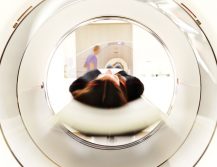
Back pain affects nearly 31 million Americans – resulting in an astronomical number of missed work days and trips to the doctor, and costing billions of dollars each year to treat. In some cases, this pain can radiate to other areas, such as the legs. This is known as sciatica.
What Is Sciatica?
Sciatica refers to pain that travels through the sciatic nerve, which branches from the lower back through the hips and buttocks and down each leg. It typically only affects one side of the body.
It usually occurs when a herniated disc, bone spur or spinal stenosis (narrowing of the spine) compresses part of the nerve – causing inflammation, numbness and pain.
If you have sciatica, you may experience symptoms including:
- “Pins-and-needles” sensation in one leg
- Sharp or searing pain
- Weakness when moving the affected leg or foot
Though sciatica patients may experience some lower back aches, their leg pain is typically more severe.
Risk Factors of Sciatica
Sciatica is fairly common, affecting roughly 15 to 40 percent of the population. However, some people are more likely to experience it, based on factors such as:
- Age – Your spine begins to degenerate as early as age 30, which can cause sciatica. As you age, your spinal discs become less resilient, increasing your risk of developing this pain.
- Manual labor – If your job requires you to lift heavy loads frequently, you could develop lumbar radiculopathy, or spinal nerve root irritation, which can cause sciatica symptoms.
- Other health conditions – The nerves of people with diabetes are more prone to damage, including the sciatic nerve. Hormonal changes increase the risk of sciatica during pregnancy. Excess body weight can also put stress on your spine.
- Physical activity – Regular running and walking are considered good for the body, but the repeated contraction of the piriformis muscle can aggravate the sciatic nerve.
- Sedentary lifestyle – Sitting compresses your spine and discs and may irritate your spinal nerve roots.
Treating Sciatica
Founding Father Benjamin Franklin once said, “An ounce of prevention is worth a pound of cure,” and this holds especially true for sciatica. While it is not always possible to prevent the condition, there are some steps you can take to keep the pain at bay, including:
- Exercising regularly – Keep your core muscles engaged during physical activities to keep your back strong. Swimming can be particularly effective because it does not put pressure on the spine.
- Maintaining good posture – Choose a seat with good lower back support and armrests. Keep your knees and hips level while sitting.
- Using good body mechanics – When standing for long periods, rest one foot on a stool or small box every so often. If you have to lift something heavy, let your legs do the work and avoid lifting and twisting at the same time.
If your sciatica is not improving, talk to your doctor about treatment options, such as:
- Heat/ice packs
- Pain medications
- Steroid injections
Doctors typically will not recommend surgery for sciatica unless you are experiencing persistent leg pain for more than four to six weeks and nonsurgical treatments have not worked. Depending on the cause and duration of the pain, one of two surgeries may be considered:
- Microdiscectomy – An open surgery using magnification is common for sciatica caused by lumbar disc herniation. In this procedure, only the portion of the disc that is pinching the nerve is removed.
- Lumbar laminectomy – For cases caused by spinal stenosis, a surgery involving the removal of the bone or disc that is pinching the nerve root is recommended.
Minimally invasive and outpatient versions of both surgeries can get you back on your feet sooner.
Comprehensive Spine Treatment in Dallas-Fort Worth
If you have sciatica, you do not have to deal with the pain on your own. The team at Spine Works Institute has expert training in the latest spinal treatments, including nonsurgical and minimally invasive surgical options. We will work with you to find the right treatment plan for your lifestyle, and help you get back to living pain-free.
Call 877.616.0700 or make an appointment online.








